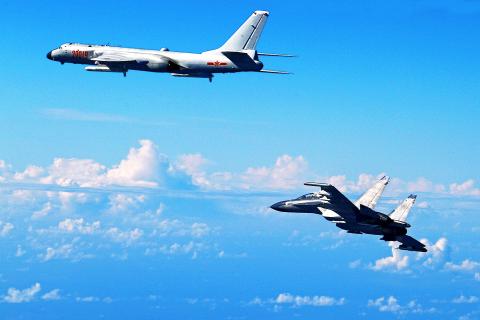Chinese military aircraft yesterday flew over the East China Sea to the south of Japan’s Okinawa Island and circled the international airspace surrounding Taiwan before passing over the Bashi Channel to return to China, officials from the Ministry of National Defense said.
It was the second time in two weeks that Chinese military aircraft have flown around Taiwan and passed over the Miyako Strait between Japan’s Okinawa and Miyako islands.
Yesterday’s flight launched at about 9am from the People’s Liberation Army (PLA) Air Force’s Eastern Theater Command bases and involved a dozen aircraft, the ministry said in a statement, adding that only four aircraft traveled the entire flight path around Taiwan.

Photo: (Shao Jing/Xinhua via AP)
Ministry officials did not provide any details on the type of aircraft that participated in the flight.
Two Xian H-6K bombers, a Tupolev Tu-154 surveillance aircraft and a Shaanxi Y-8 tactical transport aircraft participated in the previous flight on Nov. 25.
The aircraft taking part in yesterday’s flight were reportedly escorted by several Su-30 fighter jets coming in from the north as they crossed the Miyako Strait as per the PLA Air Force’s procedure for flying past the first island chain, before the main group turned south into international airspace.
They were similarly escorted after reaching airspace south of Taiwan as they flew over the Bashi Channel between Taiwan and the Philippines, before ending the mission and returning to their bases at 1:10pm, according to military sources.
The ministry said that the aircraft flew clockwise around Taiwan, whereas they flew counter-clockwise on Nov. 25.
"Our military forces monitored the PLA aircraft and had them under surveillance the entire time. There is no need to be concerned about the situation,” the statement read.
“After the PLA aircraft headed from the Chinese coast toward the East China Sea, Taiwan’s military radar stations locked onto them and tracked the entire flight,” said a senior military officer who declined to be named.
“The air force dispatched a reconnaissance patrol aircraft for surveillance and it took photographs of the Chinese aircraft and transmitted the images to a command station,” he said.
The ministry released the statement immediately after the incident. Following the Nov. 25 flight, the ministry’s delayed response drew criticism from the public and lawmakers, and raised concern that it had sought to cover up the incident.
Media reports said that neither flight infringed upon Taiwan’s or Japan’s territorial airspace, but this could not be independently verified.
Senior Chinese military officials in September announced that they will conduct “regular exercises” for flying past the first island chain, as China seeks to assert its presence in disputed islands and marine territories in the South and East China seas.
Taiwan has virtually identical claims in the South China Sea.

CHAOS: Iranians took to the streets playing celebratory music after reports of Khamenei’s death on Saturday, while mourners also gathered in Tehran yesterday Iranian Supreme Leader Ayatollah Ali Khamenei was killed in a major attack on Iran launched by Israel and the US, throwing the future of the Islamic republic into doubt and raising the risk of regional instability. Iranian state television and the state-run IRNA news agency announced the 86-year-old’s death early yesterday. US President Donald Trump said it gave Iranians their “greatest chance” to “take back” their country. The announcements came after a joint US and Israeli aerial bombardment that targeted Iranian military and governmental sites. Trump said the “heavy and pinpoint bombing” would continue through the week or as long

TRUST: The KMT said it respected the US’ timing and considerations, and hoped it would continue to honor its commitments to helping Taiwan bolster its defenses and deterrence US President Donald Trump is delaying a multibillion-dollar arms sale to Taiwan to ensure his visit to Beijing is successful, a New York Times report said. The weapons sales package has stalled in the US Department of State, the report said, citing US officials it did not identify. The White House has told agencies not to push forward ahead of Trump’s meeting with Chinese President Xi Jinping (習近平), it said. The two last month held a phone call to discuss trade and geopolitical flashpoints ahead of the summit. Xi raised the Taiwan issue and urged the US to handle arms sales to

BIG SPENDERS: Foreign investors bought the most Taiwan equities since 2005, signaling confidence that an AI boom would continue to benefit chipmakers Taiwan Semiconductor Manufacturing Co’s (TSMC, 台積電) market capitalization swelled to US$2 trillion for the first time following a 4.25 percent rally in its American depositary receipts (ADR) overnight, putting the world’s biggest contract chipmaker sixth on the list of the world’s biggest companies by market capitalization, just behind Amazon.com Inc. The site CompaniesMarketcap.com ranked TSMC ahead of Saudi Aramco and Meta Platforms Inc. The Taiwanese company’s ADRs on Tuesday surged to US$385.75 on the New York Stock Exchange, as strong demand for artificial intelligence (AI) applications led to chip supply constraints and boost revenue growth to record-breaking levels. Each TSMC ADR represents

State-run CPC Corp, Taiwan (CPC, 台灣中油) yesterday said that it had confirmed on Saturday night with its liquefied natural gas (LNG) and crude oil suppliers that shipments are proceeding as scheduled and that domestic supplies remain unaffected. The CPC yesterday announced the gasoline and diesel prices will rise by NT$0.2 and NT$0.4 per liter, respectively, starting Monday, citing Middle East tensions and blizzards in the eastern United States. CPC also iterated it has been reducing the proportion of crude oil imports from the Middle East and diversifying its supply sources in the past few years in response to geopolitical risks, expanding